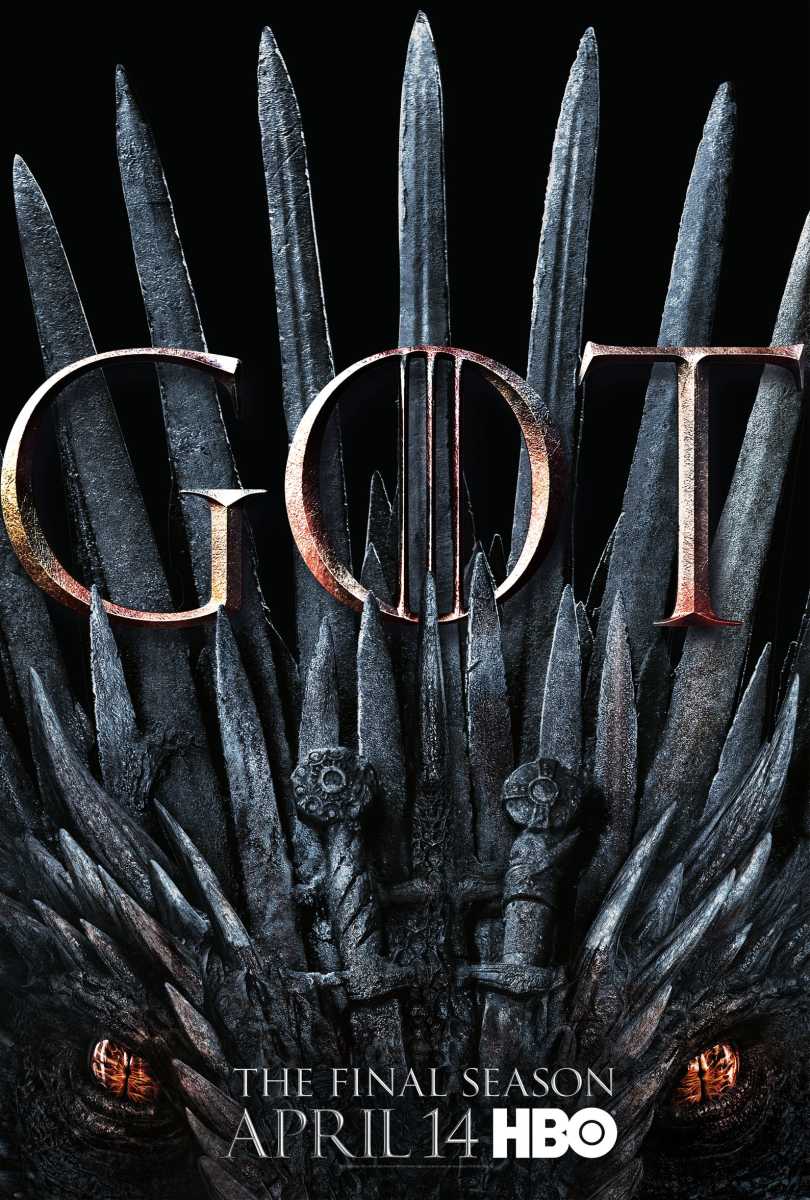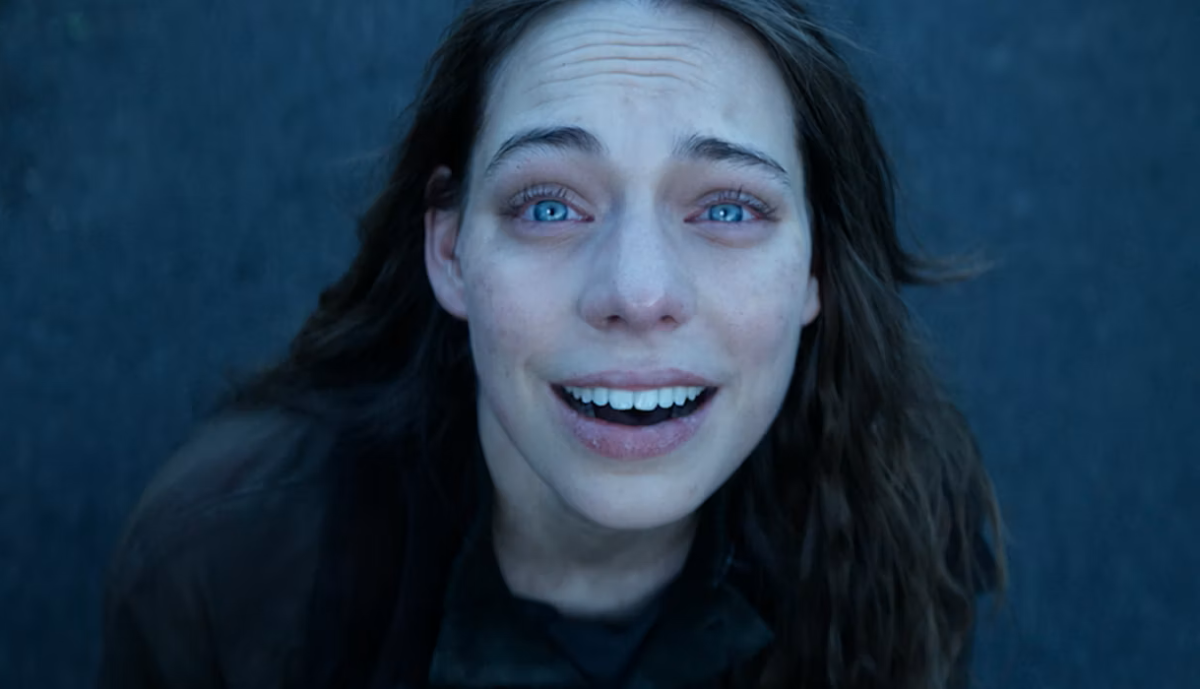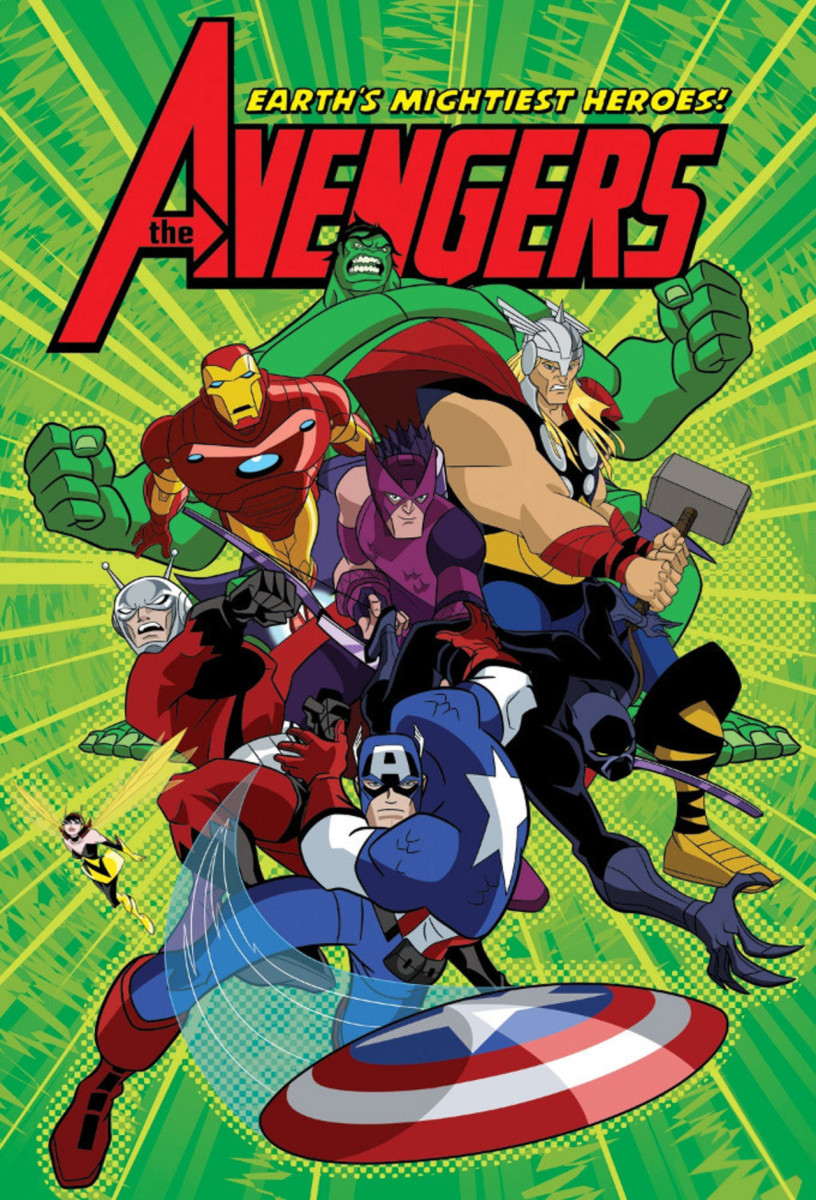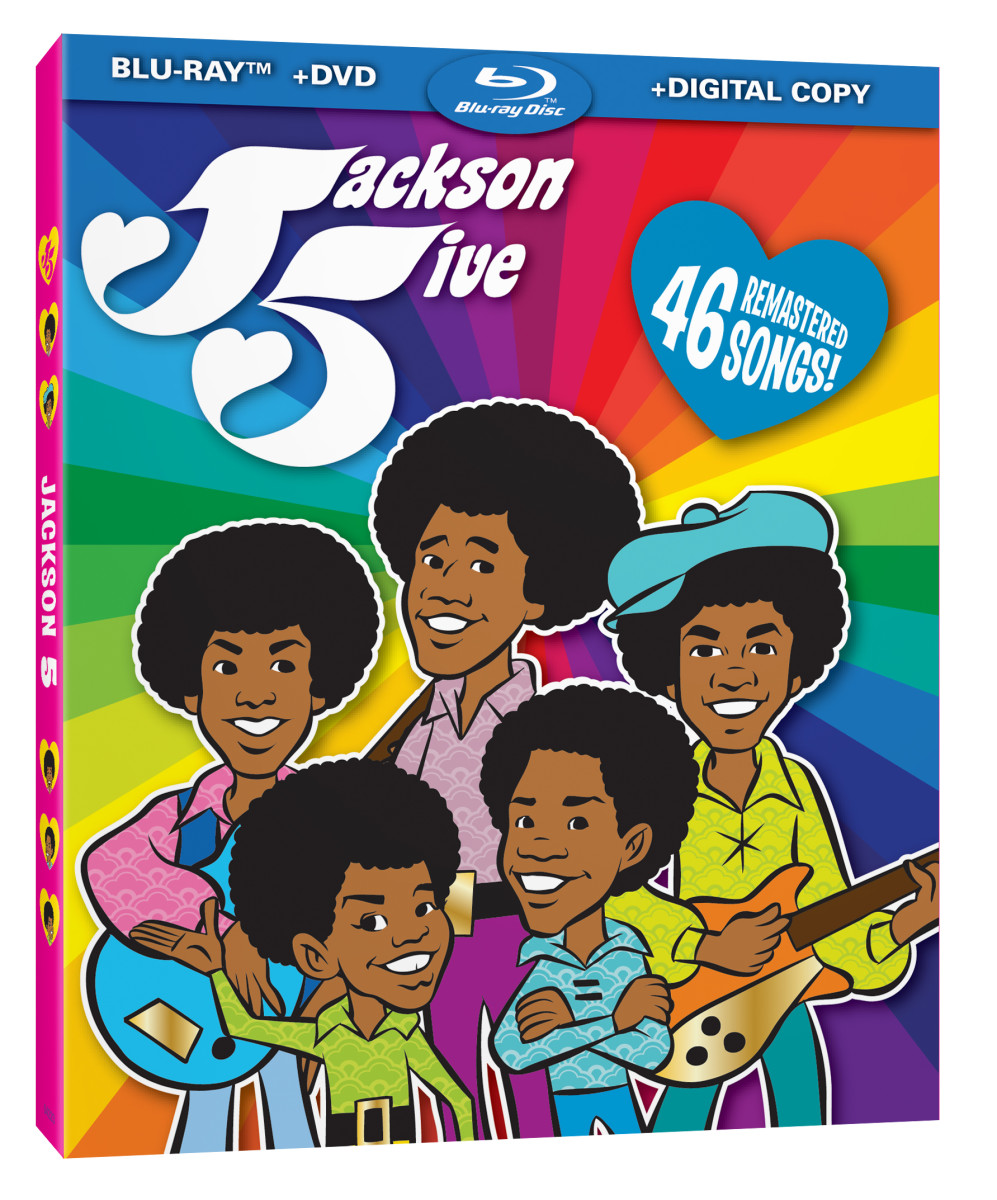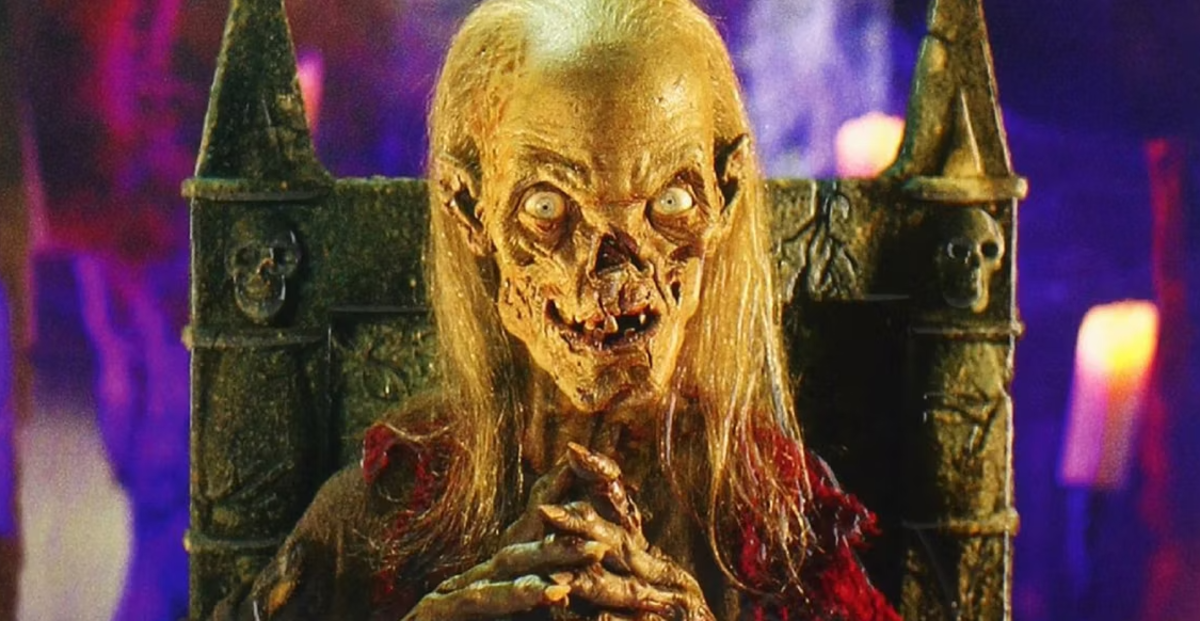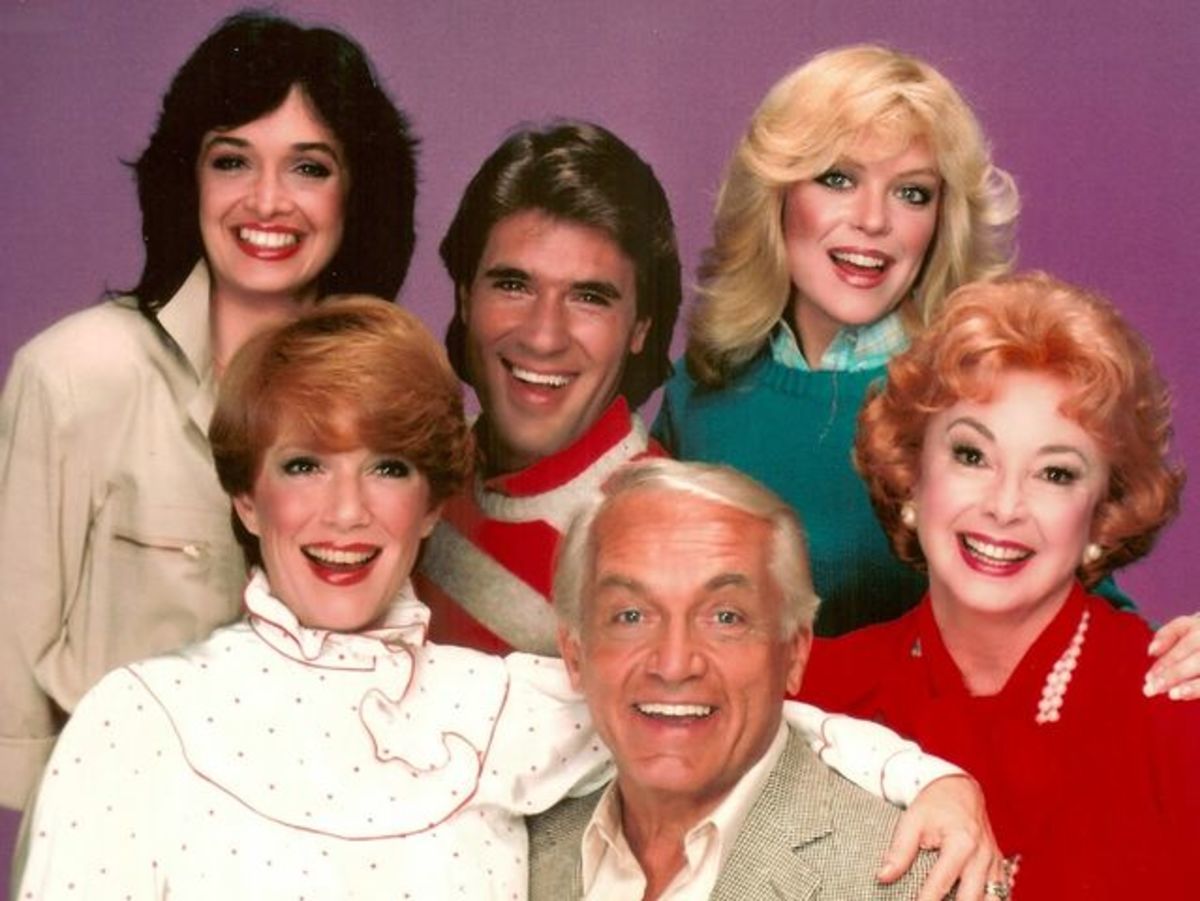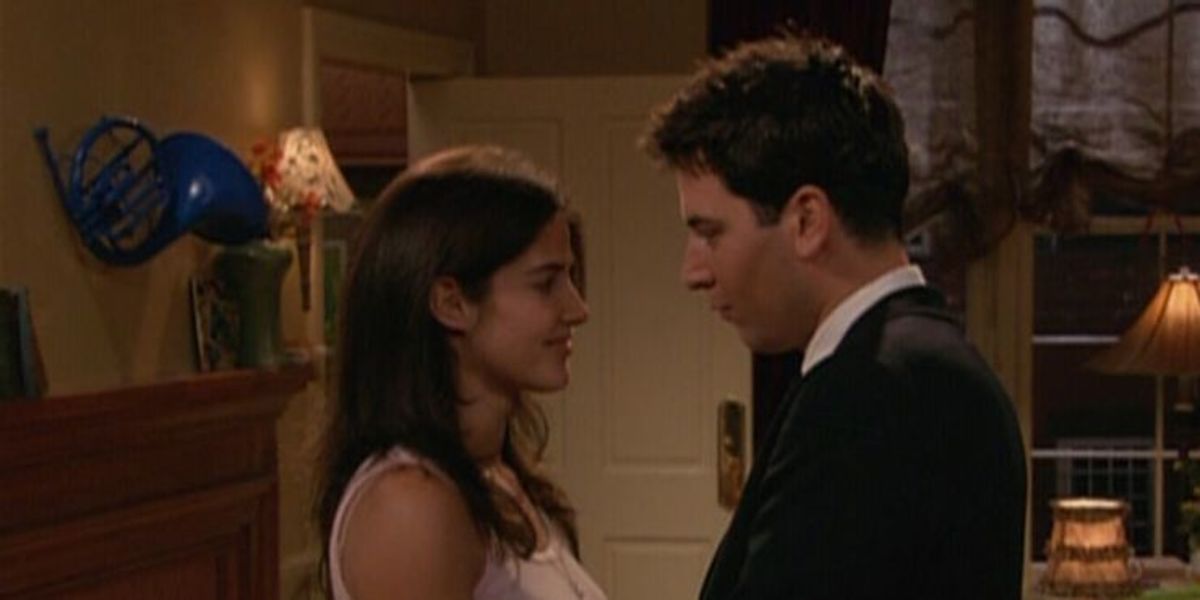Blackadder Review
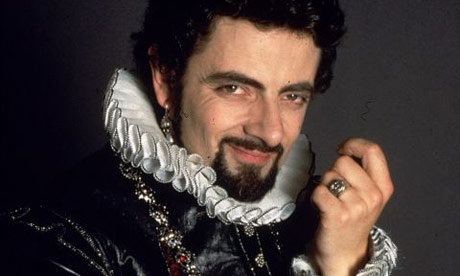
Black Adder was one of the most popular shows in British history. Aside from being one of the funniest shows from England, it also had a unique format. Between four seasons and multiple specials, the series spanned multiple centuries during different time periods.
The basic premise of the show Blackadder (Sometimes a proper name, sometimes a handle) is a nefarious scoundrel who is trying to climb his social status, more often than not through unscrupulous means. The character Blackadder is most definitely an antihero. He is generally rude to his cohorts, pedantic, Machiavellian, and selfish. However, he is oddly sympathetic. A lot of that may come out in the fact that he is significantly smarter than everyone who surrounds him. Of course, nobody was as stupid as Blackadder’s right hand man, Baldrick. In addition to his intelligence, Blackadder is also very quick witted. Rowan Atkinson is generally known for his physical comedy from doing Mr. Bean – a role that he played quite well. However, he shows off another side of his personality and does a very good job playing the part more droll and acid-tongued.
One of the truly unique aspects of Blackadder as a series was not only the historical humor, but the fact that the show’s time period changed every season. Most of these hovered around the Victorian era, but the show also went into World War I. Each season was greeted with new theme music and even episode naming. For example, episodes in Season 2 were named after key items while episodes in season 3 were plays off of classic literature. There were also variations in Black Adder’s role and surroundings depending on the time period, but the general format of the show remained.
Blackadder was, without a doubt, one of the funniest shows in British history and it earned that reputation. Aside from Rowan Atkinson, the show featured a veritable who’s who of British comedians including Hugh Laurie (Yes, Dr. House), Stephen Fry, and Miranda Richardson. Of course, good actors do not mean anything unless they have funny material, and this show does not disappoint. Hilarious dialogue and visual gags were abound in every season. However, the show was no stranger to making allusions to classical literature and, of course, historical events. The writers of the show also made no bones about making deliberately anachronistic references. For example, in one episode, Blackadder refers to his book as “a rollercoaster ride” even though the scene takes place in the 16th century. In another episode, an election is covered by a reporter mimicking contemporary TV journalists. With the farcical nature of the show, these are the sort of things viewers can take with a grain of salt – much like how it is never explained how Blackadder and his contemporaries have offspring, but how they keep winding up in the same places. Knowing one’s history might give viewers a backbone for some of the humor (In one episode, Blackadder advices Prince George not to marry the woman he had a disastrous marriage to), but it is not required.
Because of its unique format, Blackadder is definitely a show that that should be examined by each season, so without further ado, here we go:
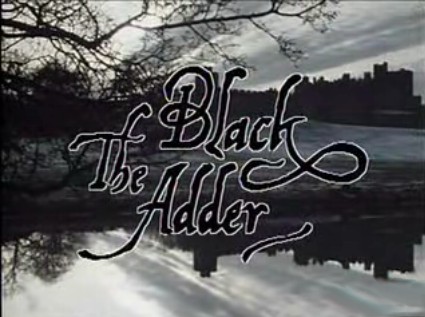
The Black Adder
Set in the Middle Ages, Edmund accidentally murders King Richard III. Edmund decides to reinvent himself as the Black Adder, following the reign of King Richard IV and taking advice of his wise servant Baldrick. Being the first season, it should be no surprise that the format of the show is a little different from the rest of the series. The characters Edmund and Baldrick are almost polar opposites of the characters they will become. Edmund is foolish, wimpy and Rowan Atkinson uses a lot of goofy voice and a kind of goofy voice for the character. Baldrick is wise and intelligent as opposed to the lovable idiot he would become. The temptation was to refer to the first season as the show’s humble beginnings, but that could not be further from the truth… at least in terms of production values. In its earliest incarnation, The Black Adder featured horses, hundreds of extras, realistic armor for costumes, on-location castle and outdoor shoots. Sadly, like many comedies, the production values seemed inversely proportionate of the comedy. To be fair, the first season is funny – very funny. However, when stacked up against the later seasons, this comes as close to a black sheep of the Blackadder saga. Even the people behind the show – including Rowan Atkinson – are forthcoming about the first season’s shortcomings. However, I still recommend the first season as, like I said, there are laughs to be found. However, I highly recommend watching it first. In fact, I recommend watching these in order.
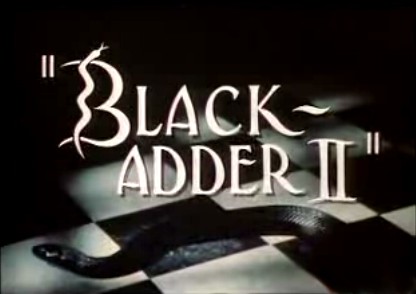
Blackadder II
In only its second season, Blackadder had finally reached its familiar form. After the astronomical costs of The Black Adder, the people behind the scenes scaled back significantly. Episodes centered around smaller, recurring sets with smaller casts. Blackadder had evolved into his scheming self and Baldrick had devolved into, as Ben Elton put it, “the stupidest person in the history… of human beings.” Blackadder II took place in the Elizabethan era. This time, Edmund was always trying to win the favor of Queen Elizabeth I. A lot of humor in this season derives from how childish Elizabeth is – such as demanding gifts from Edmund. Some of Edmund’s schemes included taking a job as executioner and taking a sea voyage in uncharted waters. Right off the bat, Blackadder II is significantly funnier than The Black Adder. Whereas The Black Adder garnered its fair share of laughs out of me, I found myself laughing more frequently and louder just from the season premiere “Bells.” Also, during this time, series regulars Rik Mayall, Hugh Laurie and Stephen Fry began making their first appearances.
In many ways, this is considered the definitive version of Blackadder since it set the precedent of the series. Frequent, the image of Edmund from this season is the most commonly-used. For example, the bearded Blackadder from season 2 is the avatar for Netflix menus.
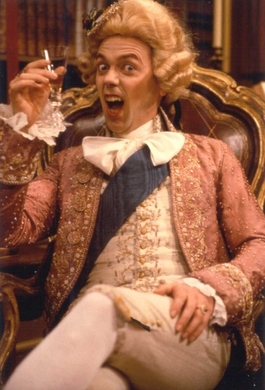
Blackadder the Third
Between Blackadder II and Blackadder the Third, this is the least drastic change between formats. In The Third, Blackadder is now a butler serving under Prince George of Whales. Blackadder seemed to spend his time trying to keep Prince George pleased and wealthy – if for no other reason then to resume mooching off his lifestyle. Fans of House will definitely find Prince George interesting: Before he was the gruff, pill-popping, cynical doctor; Hugh Laurie played Prince George, the childish, self-centered, foolish and even foppish Prince of Whales. The cast was actually slightly smaller, however former regulars Miranda Richardson and Tim McInnery made guest appearances. To be frank, this is my favorite season of Blackadder. The second season had a lot of solid episodes, but every episode in this season, every episode felt like a home run. In fact, my favorite episode from the series occurred in this season – specifically, “Ink and Incapadability.” In this episode, Baldrick accidentally burns the only printing of the original English dictionary. With no other alternatives, Blackadder decides to recreate the entire English dictionary… from scratch. The premise is simple enough, but the writers seem to explore all the possibilities which leads to laugh-out-loud hilarious dialogue and plenty of clever wordplay. In season full of gems, this one shines brighter than all others.
In between the third and fourth season was Blackadder’s Christmas Carol. Christmas Carol spoofs are nothing new – even when this was made in 1988. However, this took a new spin on the formula with the Blackadder in this version actually being a nice guy. However, he is a little too nice as people are taking advantage of him. Naturally, he is visited by the ghosts who show him the previous incarnations of Blackadder – for the most part. The Black Adder is the only one (at least from what was known at the time) that is absent. This kind of solidified the first season as the outsider of the group.
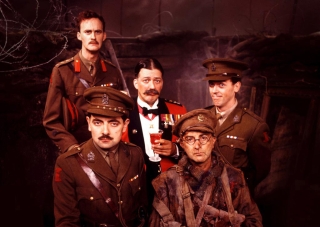
Blackadder Goes Forth
In the fourth and final season of Blackadder, Edmund and Baldrick is now in the army. Hugh Laurie returns as George. However, this time, he is not Blackadder’s boss, but rather one of his partners in crime. Stephen Fry returns as regular, playing General Melcett, and Tim McInnery returns as his sycophantic right hand man Captain Darling. Blackadder’s schemes in this season focus more on his attempts to do anything and everything to escape the trenches – even joining the Air Force. Being the only season to take place in the 20th century, this does feel like the oddball in tone. However, the laughs are still there. Since this season takes place during World War I, it took advantage by making many anti-war jokes. For example, Blackadder ponders why one pigeon would be missing when so many British soldiers were losing their lives. Blackadder Goes Forth also came under fire for this exact reason as some critics believed that the war setting was not appropriate for a comedy and that this show perpetuated the stereotype that British soldiers in World War I were “Lions Led by Donkeys.”
Although the fourth season had many funny episodes, the most noteworthy would be the finale “Goodbyeee.” In this episode, Blackadder tries in vain to feign insanity so he will not have to go to the big push. At first, this seems like a normally humorous episode until the last few moments. The characters are sent to the frontlines and begin to seriously ponder the futility of war. There is an ominous tone as the heroes prepare for battle on the frontlines. The leads take the field and in a slow-mo shot, are apparently gunned down. This fades into an open field of poppies. Although this may sound like a harsh tonal shift, it actually works quite well: The use of humor in the first half makes the characters feel more fleshed out as if nothing is changed. Thus we feel their pain when they are sent to their apparent demise. The understated ending of the poppies just proves the adage that a picture is worth a thousand words – sending the message without hammering it down the viewers’ throats.
However, there were other issues going on behind the scenes. Specifically, everyone was trying to input into the writing process. With so many cooks in the kitchen, tensions arose and scripts were constantly being rewritten. Because of these tensions, the cast and crew decided to call it quits. This is sort of a mixed bag as “Goodbyeee” is a series finale that would be hard to top. On the flip side, it would have been interesting to see what new times and ideas Blackadder and company would explore. Oh well, everyone went on to other things – Atkinson created Mr. Bean, Fry and Laurie hosted their own comedy show. (Of course, Hugh Laurie would eventually star on some doctor show, but that didn’t happen for a while.)
Blackadder made a few sporadic appearances after Goes Forth including sketches and even theatre appearances. The most noteworthy was the Millennium special Blackadder: Back and Forth. In this special, another Blackadder descendant constructs a time machine and bets former regulars Richardson, Laurie and McInnery that it works. Blackadder is naturally teamed with another of Baldrick’s descendents as the two visit different eras of Blackadder’s family tree (once again, The Black Adder and Black Adder Goes Forth are missing). Aside from encountering his ancestors, Blackadder accidentally muddles with history during encounters with Robin Hood and Shakespeare. Without giving too much away, let’s just say Blackadder realizes what a powerful tool time travel can be. This special was shot specifically for Britain’s Skyscape cinema and it shows. With bigger production values, this special definitely has a cinematic quality. While “Goodbyeee” was an excellent finale in its own right, this does feel like a more fitting end to the saga as it ties together the previous seasons.
Overall, Blackadder is one of the true gems of British comedy. Being funny was one thing – especially considering the big names who were in front of the camera. However, Blackadder was unique in not only lampooning history, but making every season a unique experience. DVDs are available and, as of this writing, it is streaming on Netflix Instant. Either way you watch it, you’ll be laughing through the generations.
Favorite Version of Blackadder?
Another Review of a Cult TV Show
- Arrested Development on Netflix Review
And now the story of a wealthy family and how they ended up on instant streaming
Other Classic TV Moments
- My Favorite TV Moments Part 1
The first half of my countdown of favorite TV moments
- My Favorite TV Moments Part 2
Part 2 of my countdown.
Can Every Show be as Consistent as Blackadder?
- Bad Episodes of Good Shows
Sometimes, even the best shows have their off days...
- Movie Review: Man of Steel by adecourv
Superman is back in one of the most anticipated films of 2013.
- Film Review: Star Trek Into Darkness
Kirk and the Enterprise are back. But should you boldly go to see this space adventure?
- Book of Mormon Review
Stone, Parker and Lopez's audacious musical send-up of religion is in its second national tour. And audiences are loving Mormons.
- Top 10 Best Three Stooges Shorts
I count down my favorite shorts of one of the funniest trios ever.
- Good Movie, Just Change the Ending
Writing a good ending for a movie isn't easy. Let's take a look at how bad endings happen to the best of us.
- Favorite Movie Moments Part 1
I countdown my favorite moments to grace the silver screen.
- Favorite Movie Moments Part 2
A continuation of my favorite moments from cinema
- Disappointing Movies
A List of six movies that didn't love up to my expectations
- Movies That Surprised Me
Whether I had sub-zero expectations or just didn't think they'd be up my alley, here's a list of movies I was surprised I liked.
- Film Review: Pacific Rim
It's big robots vs. big monsters in one of the biggest movies of the summer.
- Movie Review: Turbo
Is it Turbo Time for Dreamworks?
- Top 10 Michael J. Fox Roles
With his return to TV, it's time to look at some of Michael J. Fox's best performances.
- The World's End Review
It's the end of the world as we know it, and these guys are going down fighting and drinking.
- Lee Daniel's The Butler Review
A surprise hit about the lifelong job of serving the U.S. Presidents.
- Brooklyn Nine Nine Review
Fox's new comedy gives us a new perspective on Police shows.
- The Michael J. Fox Show Review
Michael J. Fox returns to TV in a show all about... Michael J. Fox returning to TV.

